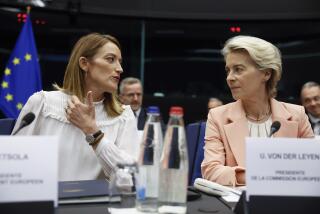Belgian Foreign Minister Claes Picked to Head NATO : Military: If confirmed, he will begin a four-year term as the alliance works to carve out a post-Cold War role.
- Share via
BRUSSELS — Ambassadors to the 16-member North Atlantic Treaty Organization on Monday selected Belgian Foreign Minister Willy Claes for the alliance’s top job of secretary general.
The appointment of Claes, 55, is expected to be confirmed later this week by NATO foreign ministers, who are now in New York for the opening of the annual session of the U.N. General Assembly.
The selection, carried out with little public debate or controversy, constitutes a badly needed smooth, swift transition for the alliance as it searches for new direction in the post-Cold War era.
Claes succeeds Manfred Woerner, who died Aug. 13 after a long battle with cancer.
Although his name was mentioned among possible successors to Woerner virtually from the start, Claes is in many ways an unlikely figure for the job. Unlike Woerner, who trained as a jet pilot and spent several years as his country’s defense minister before coming to NATO, Claes’ background is in economics and foreign affairs.
Indeed, he seems to have shown little interest in military matters. His Flemish Socialist Party also actively opposed the controversial alliance decision to deploy medium-range cruise nuclear missiles in Belgium in the early 1980s.
But diplomats involved in the selection process point to his strengths. “He’s a good Atlanticist, yet he also favors strengthening the European dimension of the alliance,” commented one NATO diplomat. “That combination is essential for our future.”
As a successful Belgian politician, he has a reputation more as a skilled consensus builder and a hard worker than a visionary. He prefers to operate with discretion rather than in the limelight.
Claes won praise for his handling of extremely delicate issues on the agenda during Belgium’s six-month presidency of the European Union last year.
He begins his four-year term at a time when the alliance is working to carve out a new role in the post-Cold War era. Created in 1949 to counter the Soviet threat to Western Europe, NATO is often called the most successful alliance in which the United States has ever participated. But with the collapse of the Berlin Wall five years ago, NATO’s main mission of containing Communist expansion effectively ended in victory, placing its own future in doubt.
Realizing this fact, Woerner quickly started moving the alliance into new areas, including peacekeeping outside member countries, and forging meaningful ties with its former enemies, including Russia. But these steps remain tentative and Claes is likely to be judged on his ability to turn them into fixtures that would guarantee the alliance’s future.
More immediately, Claes must try to ease tensions between the United States and key European partners on NATO’s role in Bosnia-Herzegovina.
The Clinton Administration has pressed for more extensive use of alliance air power to curb Bosnian Serb provocations.
But European allies--such as France and Britain, which have forces on the ground in Bosnia--see such a policy as reckless.
Brussels researcher Isabelle Maelcamp contributed to this report.
More to Read
Sign up for Essential California
The most important California stories and recommendations in your inbox every morning.
You may occasionally receive promotional content from the Los Angeles Times.













